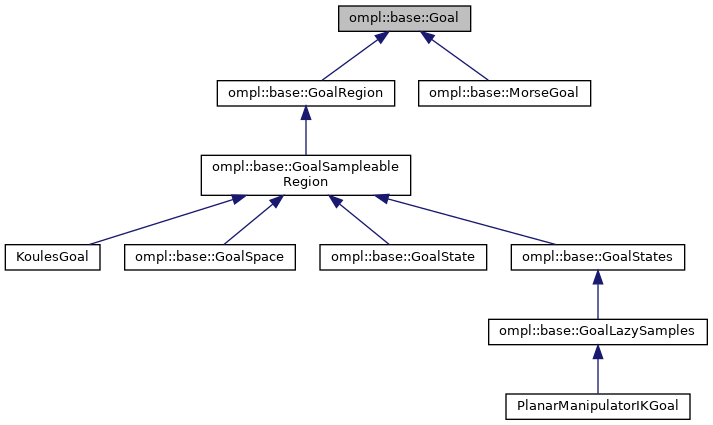ompl::base::Goal Class Referenceabstract
Abstract definition of goals. More...
#include <ompl/base/Goal.h>
Inheritance diagram for ompl::base::Goal:

Public Member Functions | |
| Goal (const Goal &)=delete | |
| Goal & | operator= (const Goal &)=delete |
| Goal (SpaceInformationPtr si) | |
| Constructor. The goal must always know the space information it is part of. | |
| virtual | ~Goal ()=default |
| Destructor. | |
| template<class T > | |
| T * | as () |
| Cast this instance to a desired type. More... | |
| template<class T > | |
| const T * | as () const |
| Cast this instance to a desired type. More... | |
| GoalType | getType () const |
| Return the goal type. | |
| bool | hasType (GoalType type) const |
| Check if this goal can be cast to a particular goal type. | |
| const SpaceInformationPtr & | getSpaceInformation () const |
| Get the space information this goal is for. | |
| virtual bool | isSatisfied (const State *st) const =0 |
| Return true if the state satisfies the goal constraints. | |
| virtual bool | isSatisfied (const State *st, double *distance) const |
| Return true if the state satisfies the goal constraints and compute the distance between the state given as argument and the goal (even if the goal is not satisfied). This distance can be an approximation. It can even be set to a constant, if such a computation is not possible. More... | |
| virtual bool | isStartGoalPairValid (const State *, const State *) const |
| Since there can be multiple starting states (and multiple goal states) it is possible certain pairs are not to be allowed. By default we however assume all such pairs are allowed. Note: if this function returns true, isSatisfied() need not be called. | |
| virtual void | print (std::ostream &out=std::cout) const |
| Print information about the goal. | |
Protected Attributes | |
| GoalType | type_ |
| Goal type. | |
| SpaceInformationPtr | si_ |
| The space information for this goal. | |
Detailed Description
Member Function Documentation
◆ as() [1/2]
template<class T >
|
inline |
◆ as() [2/2]
template<class T >
|
inline |
◆ isSatisfied()
|
virtual |
Return true if the state satisfies the goal constraints and compute the distance between the state given as argument and the goal (even if the goal is not satisfied). This distance can be an approximation. It can even be set to a constant, if such a computation is not possible.
- Parameters
-
st the state to check for validity distance location at which distance to goal will be stored
- Note
- The default implementation sets the distance to a constant.
- If this function returns true, isStartGoalPairValid() need not be called.
Reimplemented in ompl::base::GoalRegion.
The documentation for this class was generated from the following files: